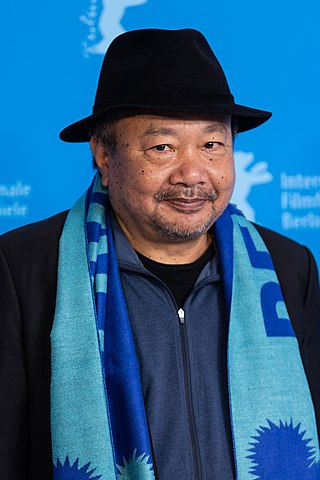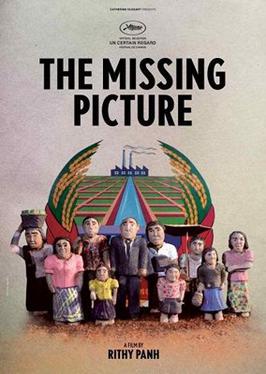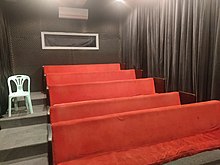Articles related to Cambodia and Cambodian culture include:

Elizabeth Becker is an American journalist and author. She has written five books and is best known for her reporting and writing on Cambodia.

Rithy Panh is a Cambodian documentary film director and screenwriter.

Cinema in Cambodia began in the 1950s, and many films were being screened in theaters throughout the country by the 1960s, which are regarded as the "golden age". After a near-disappearance during the Khmer Rouge regime, competition from video and television has meant that the Cambodian film industry is a small one.

Vann Nath was a Cambodian painter, artist, writer, and human rights activist. He was the eighth Cambodian to win the Lillian Hellman/Hammett Award since 1995. He was one of only seven known adult survivors of S-21 camp, where 20,000 Cambodians were tortured and executed during the Khmer Rouge regime.

S-21: The Khmer Rouge Killing Machine is a 2003 documentary film directed by Rithy Panh. Rithy, himself a survivor of the Khmer Rouge, brought together two former prisoners of the regime with their former captors at Tuol Sleng Genocide Museum, the former Security Prison 21 (S-21) under the Khmer Rouge.

Rice People is a 1994 Cambodian drama film directed and co-written by Rithy Panh. Adapted from the 1966 novel Ranjau Sepanjang Jalan, by Malaysian author Shahnon Ahmad, which is set in the Malaysian state of Kedah, Rice People is the story of a rural family in post-Khmer Rouge Cambodia, struggling to bring in a single season's rice crop. It was filmed in the Cambodian village of Kamreang, in the Kien Svay and Boeung Thom areas of Kandal Province near Phnom Penh, on the banks of the Mekong River. The cast features both professional and non-professional actors.

Dy Saveth is a Cambodian actress and first Miss Cambodia (1959) often referred to as the "actress of tears". She is "one of the most beloved actresses from the 1960s era of Cambodian film".
Bophana: A Cambodian Tragedy, or Bophana, une tragédie cambodgienne, is a 1996 French-Cambodian made-for-television docudrama directed by Rithy Panh.

The Burnt Theatre, or Les Artistes du Théâtre Brûlé, is a 2005 French-Cambodian docudrama directed and co-written by Rithy Panh. A blend of fact and fiction, based on the actual lives of the actors, the film depicts a troupe of actors and dancers struggling to practise their art in the burned-out shell of Cambodia's former national theatre, the Preah Suramarit National Theatre in Phnom Penh.

Chum Mey is one of only seven known adult survivors of the Khmer Rouge imprisonment in the S-21 Tuol Sleng camp, where 20,000 prisoners, mostly Cambodians, were sent for execution. Formerly a motor mechanic working in Phnom Penh, he was taken to the prison on 28 October 1978, accused of being a spy. His life was only spared because of his ability to repair sewing machines for Pol Pot's soldiers. In 2004, he described the killing of his wife and son:
"First they shot my wife, who was marching in front with the other women," he said. "She screamed to me, 'Please run, they are killing me now'. I heard my son crying and then they fired again, killing him. When I sleep, I still see their faces, and every day I still think of them".
Am Rong was a Cambodian soldier and filmmaker, who acted as a spokesman on military matters for the Khmer Republic during the Cambodian Civil War. Western journalists commented on the irony of his name as he gave briefings which "painted a rosy picture of the increasingly desperate situation on the ground" during the war.

The Missing Picture is a 2013 Cambodian-French documentary film directed by Rithy Panh about the Khmer Rouge.

Davy Chou is a Cambodian-French filmmaker. He has written, directed and produced several films. Chou made his feature length debut with Diamond Island (2016) and made his follow-up with the film Return to Seoul (2022).

Red Wedding is a 2012 documentary film co-directed by Lida Chan and Guillaume Suon, which portrays a victim of forced marriage under the Khmer Rouge regime.
Guillaume Suon is a French-Cambodian filmmaker.
Lida Chan is a Cambodian filmmaker.
Anvaya is a Khmer association established in 2010 with a self-described mission to "bring together and support the returning movement of scattered Cambodians from overseas". Anaya is an independent, non-political, non-profit organization. It is an active organization within Cambodia and in countries with a Cambodian population that has been scattered.

Exile is a 2016 Cambodian-French documentary film edited, written, and directed by Rithy Panh which explores the effects of forced displacement. It was selected to screen in the Special Screenings section of the 2016 Cannes Film Festival.

The Elimination is an autobiographical account of Rithy Panh's survival during the Pol Pot regime. It was co-written with novelist Christophe Bataille and published in 2011 by Grasset Publishing. This book is also an essay and report that documents the one-on-one conversations between Rithy Panh and Duch, a former Khmer Rouge officer. To better represent the Khmer Rouge regime and to further influence the reader's mind, Rithy Pan juxtaposed his own personal story with the interviews with Duch





















